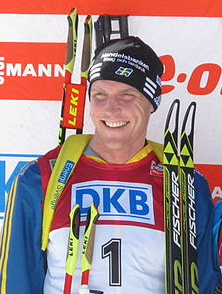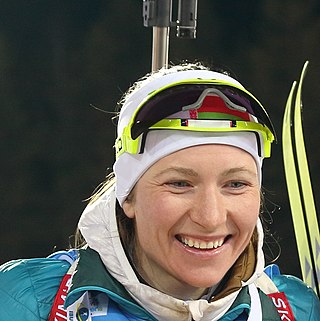
The biathlon is a winter sport that combines cross-country skiing and rifle shooting. It is treated as a race, with contestants skiing through a cross-country trail whose distance is divided into shooting rounds. The shooting rounds are not timed per se, but depending on the competition, missed shots result in extra distance or time being added to the contestant's total.

Ole Einar Bjørndalen is a retired Norwegian professional biathlete and coach, often referred to by the nickname, the "King of Biathlon". With 13 Winter Olympic Games medals, he is second on the list of multiple medalists behind Marit Bjørgen who has won 15 medals. He is also the most successful biathlete of all time at the Biathlon World Championships, having won 45 medals. With 95 World Cup wins, Bjørndalen is ranked first all-time for career victories on the Biathlon World Cup tour. He has won the Overall World Cup title six times, in 1997–98, in 2002–03, in 2004–05, in 2005–06, in 2007–08 and in 2008–09.

The T-72 is a family of Soviet main battle tanks that entered production in 1969. The T-72 was a development based on the T-64 using thought and design of the previous Object 167M. About 25,000 T-72 tanks have been built, and refurbishment has enabled many to remain in service for decades. It has been widely exported and has seen service in 40 countries and in numerous conflicts. The Russian T-90 introduced in 1992 and the Chinese Type 99 are further developments of the T-72. Production and development of various modernized T-72 models continues today.

The Type 96 or ZTZ96 is a Chinese second generation main battle tank (MBT). The final evolution of the Type 88 design, the Type 96 entered service with the People's Liberation Army (PLA) in 1997. The later variants of the Type 96 are currently in PLA service together with China's third generation MBT, the Type 99.

Ricco Groß is a former German biathlete. He is one of the most successful biathletes of all time at the Winter Olympics and the World Championships.

Olga Alekseyevna Zaitseva is a former Russian biathlete. She began her career in 1994. After not competing in the 2014–15 season, Zaitseva announced her retirement on 24 January 2015. Shortly afterwards she announced that she had been appointed as caretaker head coach of the Russian biathlon team.
The 43rd Biathlon World Championships were held in Pyeongchang, South Korea from February 13 to February 22, 2009. It was the first time that the Biathlon World Championships were held in Asia.

Björn Ferry is a former Swedish biathlete and medal winning Olympian. He began competing internationally in World Cup competitions in 2001, but did not win his first international race until the 2007–2008 season. In 2007, he won gold in the mixed relay event at the Biathlon World Championships. The next year, at his third Winter Olympics appearance, he won the gold medal in the pursuit event. He started the event in 8th place as determined by the previous sprint event, but managed to overtake the race leader on the final lap.

Darya Uladzimirauna Domracheva is a retired Belarusian biathlete and coach who competed in the Biathlon World Cup from 2006 to 2018. She won a gold medal in the 4×6 km relay and a silver medal in the mass start competition at the 2018 Winter Olympics, three gold medals in the pursuit, individual, and mass start competitions at the 2014 Winter Olympics, and a bronze medal in the individual competition at the 2010 Winter Olympics. She was a Biathlon World Cup overall winner for the 2014–15 season.

Evgeny Romanovich Ustyugov is a Russian former biathlete. Born to cross-country skiers, Ustyugov was introduced to biathlon at the age of three. He started his career in junior tournaments in 2005, before going professional three years later in the European Championships. He is an Olympic champion in the men's 15 km mass start event at the 2010 Winter Olympics in Vancouver, British Columbia, Canada. Prior to the 2010 Olympic Games, his best World Championship finish in an individual event was 20th place.

Anton Vladimirovich Shipulin is a retired Russian biathlete and politician serving as the member of the State Duma since 2019.
The 2014–15 Biathlon World Cup – Relay Men started on Saturday December 13, 2014 in Hochfilzen and finished on Saturday March 14, 2015 at the World Championships in Kontiolahti. The defending titlist Germany finished on the 3nd place. The title was won by Russia.
The 2016–17 Biathlon World Cup – Relay Men started on Sunday 11 December 2016 in Pokljuka and finished on Sunday 5 March 2017 in Pyeongchang. The defending team was Norway.
The 2016–17 Biathlon World Cup – Relay Women started on Sunday 11 December 2016 in Pokljuka and finished on Sunday 5 March 2017 in Pyeongchang. The defending team was Germany.
The 2017–18 Biathlon World Cup – Relay Men started on Sunday 10 December 2017 in Hochfilzen and will finish on Sunday 18 March 2018 in Oslo Holmenkollen. The defending team is Russia.
The 2017–18 Biathlon World Cup – Relay Women started on Sunday 10 December 2017 in Hochfilzen and will finish on Saturday 17 March 2018 in Oslo Holmenkollen. The defending team is Germany.

The International Army Games is an annual international military sports event organized by the Ministry of Defence (MoD) of Russia. The event, which was first staged in August 2015, involves close to 30 countries taking part in dozens of competitions over two weeks to prove which is the most skilled. The games have been referred to as the War Olympics. In addition to the competition, the International Army Games includes a military theme park, a recruitment station, and souvenir shops.

Alabino is a rural locality in the Moscow Oblast of Russia. With a population of over 600 people, it is part of the urban settlement of Selyatino. Until 2006, Alabino was part of the Petrovsky Rural District.
The 2020–21 Biathlon World Cup – Relay Men started on 6 December 2020 in Kontiolahti and will finished on 5 March 2021 in Nové Město
The 2020–21 Biathlon World Cup – Relay Women started on 5 December 2020 in Kontiolahti and will finish on 4 March 2021 in Nové Město















